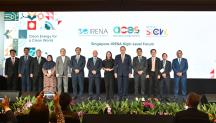

Renewable energy will be key to Paris climate talks, IRENA says
Newsletter
Paris, France, 10 September 2014 – As France prepares to host the make-or-break Paris Climate Conference in December 2015, and with expectations that the outcome will define global climate efforts in the future, renewable energy is increasingly taking centre stage in the climate discussion.
REthinking Energy, a new report released by the International Renewable Energy Agency(IRENA) this week, underlines that renewables must be part of any solution to avoid catastrophic climate change. IRENA presented the new report at the Senate of France on Tuesday highlighting the economic, social, technological, environmental, and climate dynamics of the global energy transition.
“Renewable energy provides an answer to many of the most pressing socio-economic challenges faced by governments today, including energy access, energy security, health and environmental concerns,” said Adnan Z. Amin, Director-General of IRENA.
“However, if we continue on our present path, we will not be able avoid the most serious impacts of climate change. The ongoing transformation of the global energy systems with higher shares of renewables offers ones of the most economically attractive options in the effort to decarbonise energy”
The report highlights the fact more new renewable power capacity is being installed than new capacity in fossil and nuclear power combined every year for the past three years. And that while over $200 billion is being invested annually in renewable energy worldwide, more investment is needed for renewables to have a profound impact on carbon dioxide (CO2) emissions reduction.
These challenges and opportunities highlighted in the IRENA report will also be of central importance at the upcoming UN Climate Summit in New York later this month, as well as the high-level international climate summit to be held in Paris in next year. That event, the 21st Conference of Parties to the United Nations Framework Convention on Climate Change
(UNFCCC), or “COP21”, will take place in the French capital between 30 November and 11 December 2015.
Ronan Dantec, senator, Loire-Atlantique, under whose patronage the report was released in the French Senate, said: "On a global scale, recognising the difficulties that governments have in reaching an agreement capable of meeting the challenges at stake, optimism must be fed by concrete dynamics and, above all, the rapid deployment of renewable energy worldwide.”
With global population projected to top 8 billion by 2030, electricity demand is expected to more than double as more people move into the middle class and consume greater quantities of energy. Historically, as energy consumption grows, so has carbon dioxide emissions. The burning of fossil fuels to generate electricity accounts for more than 40 percent of man-made CO2 emissions today.
Renewable energy sources – including bioenergy, geothermal energy, hydropower, ocean, solar and wind energy – are up to 250 times less carbon-intensive than coal and up to 120 times less so than the cleanest fossil fuel, natural gas.
While the first edition of REthinking Energy focuses on power generation, it also points out that renewable energy use also needs to be increased for end uses like transportation, industry and buildings.
Download the full report here.




